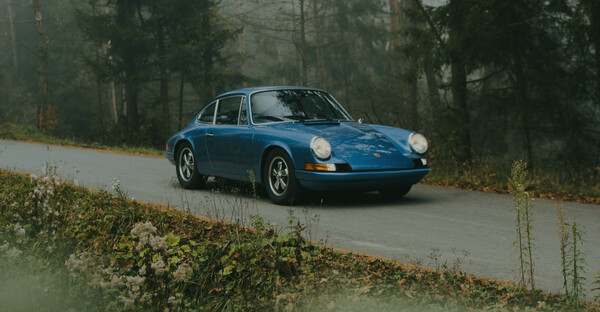Description
Offered here from long term ownership is a well-known example of what is considered by many knowledgeable enthusiasts to be the finest British sporting car of the Vintage period.
Vauxhall 30-98 adherents will maintain that while Bentley generated greater publicity - thanks largely to their victories at Le Mans - the Vauxhall company (which raced at both Grand Prix and Tourist Trophy level) had produced a car that could run rings around Bentleys on cross-country journeys.
The 'big engine/ lightweight car' formula has been repeated to good effect many times throughout the history of the sporting motor car, and Vauxhall's famous 30-98 was one of its earliest successful applications. As has so often been the case, the spur behind this particular combination was the desire for competition success; the first 30-98 being constructed at the behest of car dealer and motor sport competitor, Joseph Higginson, in 1913. Higginson's first objective was victory in the Shelsley Walsh hill climb in June of that year, and the Laurence Pomeroy-designed 30/ 98 duly obliged, setting a hill record in the process which was to stand for 15 years.
Laurence Pomeroy's tenure as Vauxhall's Chief Engineer saw the Luton-based concern produce some of the truly outstanding designs of the Edwardian period, commencing with the 20hp Prince Henry in 1910. A larger version of the Prince Henry's four-cylinder side-valve engine was developed for its successor, the D-Type, which, with some 70bhp on tap, was good for 70mph-plus when not overburdened by formal coachwork. Pomeroy's 30-98 was powered by a 4½-litre, four-cylinder, side-valve engine - in effect a stretched version of the Prince Henry/ D-Type's - mounted in a conventional but lightweight chassis; suspension being by beam axle at the front and live axle at the rear, with semi-elliptic springs all round. Power was transmitted via a multi-plate clutch to a robust four-speed gearbox, and thence via a short prop-shaft to the straight-cut bevel rear axle. The braking system consisted of a foot-operated transmission brake and a handbrake operating on the two rear drums, the front wheels being un-braked.
At first glance this unremarkable specification seems an unlikely one for a performance car - even an Edwardian example - but the 30-98's 90bhp-plus power output, combined with a weight of only 24cwt (with the factory-built, four-seater 'Velox' tourer coachwork) gave it a formidable power-to-weight ratio for the time. A fully road-equipped 30-98 was capable of around 85mph, and when stripped for racing, the company guaranteed a top-speed in excess of 100mph for the later overhead-valve models, a capability demonstrated at Brooklands on numerous occasions.
Only a handful of cars were sold before the outbreak of WWI interrupted production, and when manufacture resumed in 1919 the model was given the designation 'E-Type' - its Prince Henry predecessor having been the 'C' and the 25hp Tourer the 'D'. Manufacture of the E-type ceased in September 1922 after 287 cars had been constructed, there then being a slight hiatus in production before its successor, the overhead-valve 'OE', commenced delivery to customers in early 1923. Despite a reduction in capacity to 4. 2 litres, the power of the OHV motor went up to 110bhp-plus with far more scope for further development and greater power still, making the OE a true rival to the 4½ Litre Bentley.
The OE was not to gain front-wheel brakes until late 1923, when a cable system was introduced. This was operated, along with the transmission brake, by the foot brake. Total production of OEs numbered 312 cars.
‘OE250’ offered here, boasts arguably the best specification of 30-98 produced by Vauxhalls, with cable operated front brakes, larger rear brake drums, larger fuel tank, heavier duty Hartford shock absorbers and mounting brackets, counter balanced crankshaft, a front door which made it possible to exit the car with the hood up, slightly re-modelled bonnet line and front wings.
'OE250' left Vauxhall's Luton factory on 27th July 1925 and was registered as 'UM 2060', a Leeds County Council mark. The original coachwork is unknown but by 1927 the car had a racing two-seat body fitted; it was advertised in The Autocar of 9th September that year having covered some 3, 000 miles.
In 1949, 'OE250' was purchased by motor engineer Arthur Archer, who kept the car until 1985. Acknowledged as the world authority on the Vauxhall 30-98, Arthur had purchased 'OE250' from one Eclin Molyneux (original purchase receipt on file) as a rolling chassis restoration project, complete with sidevalve engine 'E344' but lacking both a body and bulkhead, but with the correct type original wings, suggesting the car was fitted with a Velox body from new (see images on file). It is understood that Mr Molyneux had purchased the 30-98 from Barry Drake, assistant workshop manager at Ricardo. 'OE250' was pictured in Motor Sport's edition of 2nd April 1949.
Arthur rebuilt 'OE250' utilising many parts from 'E312', an earlier E-type 30-98 that he owned, including the older car's body. During the 1950s, 'UM 2060' was used as his 'daily driver' and for numerous VSCC events, including the Bisley Rally, Welsh Trial, and Prescott Hill Climb. Following his father's death in 1953, Arthur was forced to concentrate more on the family business and 'OE250' was confined to road use only thereafter.
In 1984 Arthur Archer transferred the body back to chassis 'E312' and the following year sold 'OE250' as a rolling chassis to Paul Dixon. Engine 'OE224' was included in the sale together with a multitude of useful parts that Arthur had accumulated over the years, including a near-perfect cylinder head.
Naturally, given its unrivalled experience with the Vauxhall 30-98, Archer's of Dunmow was commissioned to overhaul the rear axle and engine 'OE224', fitting the latter with a slightly hotter Julian Ghosh camshaft in the process (see photographic records on file). Master coachbuilder Steve Penny was commissioned to build a replica Velox body to correct specification, the original wings were restored and following further work by Archer's, the car was sent for trimming to John Foy, the man responsible for upholstering Nic Portway's unique 30-98 saloon.
Following its completion, 'UM 2060' participated in VSCC events and was also used extensively for touring. Serviced by Archer's, the car was offered for sale at a UK auction in 2012 where it was purchased by well-known collector Hugh Palmer, who in turn passed it onto the current owner circa 10 years ago.
A great enthusiast of Edwardian and Vintage cars he has used the car enthusiastically for touring. During his ownership the car has benefitted from an engine rebuild by specialist Jeremy Brewster in 2019- see invoices on file, attention from Jonathan Wood, and has recently been fitted with a freshly rebuilt correct type Watford magneto by our sister restoration business IS Polson. Since its restoration some 28 years ago, 'UM 2060' has been toured extensively and is presented in a nicely mellowed touring condition.
As is the case with most 30-98s, 'OE250' is not a 'matching numbers' car. However, it does have a known and continuous history and the Arthur Archer connection is significant. 'OE250' was Arthur's personal car, and over the 30-plus years of his ownership evolved into what it is today. There are several period photographs of the car with Arthur Archer behind the wheel.
A correct and original example of one of the ultimate vintage sports cars, offering arguably the best specification available for these cars. ‘OE250’ will as when new, provide the new owner with the finest of sporting cars, able as in period to take the fight to the hordes of Bentleys on events such as the Flying Scotsman, Peking Paris and Shamrock Rally.
















